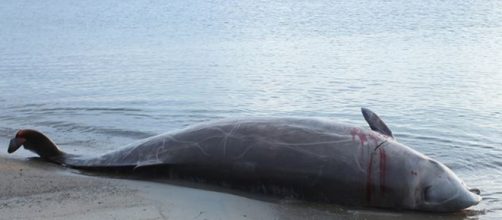Horrors of plastic pollution have once again come to the fore. This time the victim was a Cuvier’s beaked whale and when found, it was in its dying moments. It had washed ashore at Compostela Valley on the beach in the Philippines and had ingested a huge quantity of plastic that added up to nearly 80 pounds. Plastic is a non-biodegradable substance and an eyesore for the environment. Marine creatures like whales mistake them for edible stuff. They cannot differentiate between normal food and plastic and when they ingest food, the plastic items also enter their system.
The animals ultimately pay the price with their lives.
Daily Mail UK reports environmental officials tried to establish the cause of death and a necropsy revealed the truth. Its stomach contained plastic of different types, shapes, and sizes that ranged from rice sacks and shopping bags to innumerable varieties of other similar products. These had been floating in the ocean before the whale swallowed them and lost its life.
Dead whale washed ashore with 88 pounds of plastic in its stomach https://t.co/QlZNrwjZn7 pic.twitter.com/lYalMUuMJg
— The Hill (@thehill) March 18, 2019
Dead whales a wakeup call for the world
The authorities performed a necropsy on the juvenile male Cuvier’s beaked whale to establish the cause of death.
Specialists of D'Bone Collector Museum undertook the operation to find out the reasons for the clogging of its stomach. The team recovered a whole range of products that should never have been in the water in the first place. Daily Mail UK says American marine biologist Darrell Blatchley who was involved in the exercise said, “It's so sad to see the effect humans are having on sea life.” He wants the government to take action “against those who continue to treat the waterways and ocean as dumpsters.”
A whale dies with *40 kgs* of plastic in its stomach.
— Dr Lauren Gavaghan (@DancingTheMind) March 18, 2019
"I was not prepared for the amount of plastic...roughly 40 kilos of rice sacks, grocery bags, banana plantation bags and general plastic bags. Sixteen rice sacks in total."#ExtinctionRebellion https://t.co/osYCwDGbkM
This instance of the loss of another whale to plastic pollution is a pointer to the evils of the continued use of non-biodegradable substances in our daily lives.
There is a greater awareness today about the disadvantages of plastic and there are efforts to arrest the trend of reliance on single-use plastics but the damage is already done. Plastic waste has become a serious threat to marine creatures.
Plastic waste in oceans threaten marine animals
According to The Guardian, a report by the Ocean Conservancy released in 2017 indicates a scene that does not portend well for marine animals. It seems some countries in Southeast Asia continue to use single-use plastics. This generates unwanted plastic waste that ends up in the oceans.
Marine biologist Darrell Blatchley, the owner of the D’Bone Collector Museum, has been engaged in examining dead whales and dolphins for a decade.
He has come across 57 cases of deaths of these animals from an accumulation of rubbish and plastic in their stomachs. In the opinion of marine biologists, nearly 300 pilot whales, sea turtles, and dolphins die every year due to this factor. Last year, a dead sperm whale with 13 lbs of plastic in its stomach washed up on an Indonesian beach.


